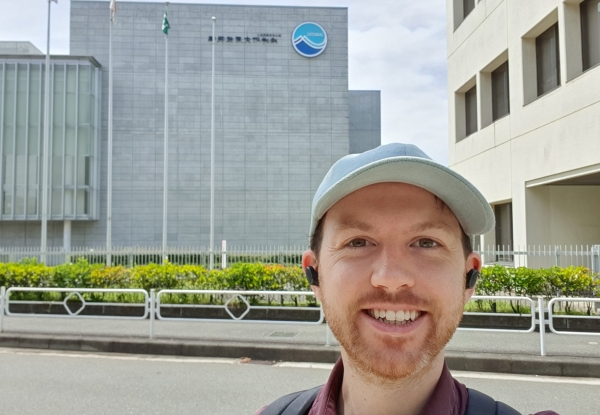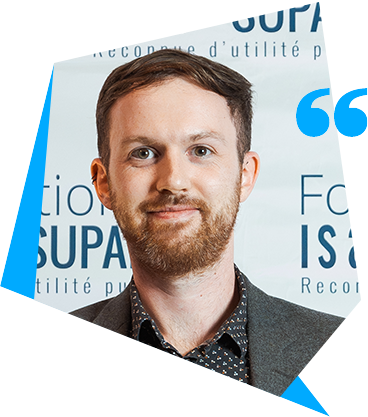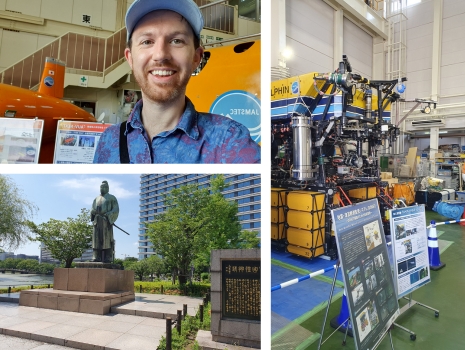< back to articles
3 months of research at JAMSTEC for Dennis
Published on
Dennis Wilson, a teacher-researcher at DISC within ISAE-SUPAERO, was supported by the Foundation for a 3-month stay in Japan. The aim of this stay was to study the application of interpretable artificial intelligence to the modeling of El Niño – Southern Oscillation (ENSO). The aim of this research project is to demonstrate the importance of aerospace engineering for environmental applications. He tells us all about it.

How would you sum up your stay?
My three-month visit to the Japan Agency for Marine and Terrestrial Science and Technology (JAMSTEC) was a defining experience in my research career. This stay enabled me to work on cutting-edge projects in the fields of oceanography and climate science, in particular on the application of artificial intelligence (AI) to the modeling of ocean dynamics and climate change.
Why did you choose Japan for this research trip?
Dennis Wilson

My motivation for joining JAMSTEC was multiple and deeply rooted in my academic and professional background. Knowing the excellence of this world-renowned research institute in the field of marine sciences, I saw this stay as a unique opportunity to deepen my knowledge and contribute to research of international scope.
Having already worked on plastic pollution of the oceans, in particular using JAMSTEC’s deep-sea debris database, I was particularly motivated by the opportunity to see first-hand the ROVs that had collected this valuable data. My main objective, however, was to take part in an ambitious project using the SINTEX model, a complex climate model used by the IPCC to predict future climate. Working on improving the accuracy of this model using interpretable machine learning techniques represented a stimulating intellectual challenge for me, and a chance to advance science in a field crucial to the future of our planet.
How did the trip go?
My time at JAMSTEC was rich in learning and experience, both academically and on a personal and cultural level. Academically, I had the opportunity to collaborate with leading researchers in the field of marine and climate sciences. The application laboratory, where I was based, offered a dynamic and innovative research environment, conducive to the exchange of ideas and scientific creativity. I was able to deepen my knowledge of climate modeling, while exploring new AI-based approaches to improving climate forecasting.
Among the highlights of my stay were the intensive work sessions on the SINTEX model, where I was able to explore different machine learning techniques for refining climate forecasts. These moments of reflection and experimentation were particularly rewarding, as they enabled me to put complex theoretical concepts into practice while contributing to a project of global importance. The climatologists I worked with were particularly enthusiastic about the interpretable nature of the AI method I developed and the way it improved the prediction of future trends in the El Niño phenomenon, a climatic event with global repercussions.
Culturally, living in Japan was an unforgettable experience. The country’s close relationship with the ocean, whether through ocean exploration or marine life, reinforced the importance of the modeling work I was doing. Indeed, one of the direct applications of our research was to forecast the effects of the El Niño phenomenon on fishing activity in Japan, a sector crucial to the country’s economy and culture. This immersion in Japanese culture also translated into a deep appreciation of the richness of seafood, which I was able to discover by tasting sushi and trying different varieties of seafood. These experiences gave me an even deeper understanding of the importance of the ocean in Japanese daily life.

On a personal level, this stay enabled me to step out of my comfort zone and adapt to a new environment, both professionally and culturally. The experience helped me develop greater resilience and adaptability, essential qualities in the world of international research.
What do you retain from these 3 months of research?
My time at JAMSTEC added considerable value to my career. Firstly, it enabled me to work on a cutting-edge research project, applying AI techniques to a complex climate model used by the IPCC. This experience reinforced my expertise in climate modeling and machine learning, skills that are increasingly in demand in the field of climate change research.
In addition, this stay was a major asset in advancing my ERC research proposal at ISAE on climate modeling with AI. The preliminary results obtained at JAMSTEC served as a solid basis for this proposal, demonstrating the feasibility and potential impact of using AI to improve the accuracy of climate forecasts. This breakthrough has strengthened my confidence in the relevance of my research and given new impetus to my scientific ambitions.
My time at JAMSTEC also brought significant added value to ISAE’s research activities. The collaborations established with JAMSTEC researchers have opened up new prospects for joint research projects between our institutions. What’s more, the technical and methodological skills I acquired during this stay will be put to good use in my future research at ISAE, particularly in the context of interdisciplinary projects aimed at integrating AI into climate and environmental modeling.
Finally, this stay strengthened my professional network at international level, which is a major asset for the development of future collaborations between ISAE and leading research institutions such as JAMSTEC.
How did the trip turn out?
My time at JAMSTEC was an enriching experience in every respect. It enabled me to develop advanced technical skills, expand my professional network, and strengthen my research proposal for the ERC. On a personal level, I was able to discover a new culture and develop greater resilience and adaptability. This stay not only contributed to my professional development, but also added value to ISAE’s research activities, opening the way to new collaborations and integrating innovative approaches to climate modeling. I would like to express my deep gratitude to the Fondation ISAE-SUPAERO for their support, which made this invaluable experience possible.
I would like to express my deepest gratitude for your support, which enabled me to enjoy an invaluable research stay at JAMSTEC. Thanks to your generosity, I was able not only to advance my research in climate modeling, but also to establish international collaborations that are essential for carrying out large-scale projects, far beyond what we can accomplish in our day-to-day academic lives.
Climate change is a global and complex challenge, requiring diversified approaches. Aerospace engineering plays a crucial role, but it is equally important to engage in other fields such as climate modeling to find integrated and effective solutions. I am deeply grateful to have been able to contribute to this cause thanks to your support.